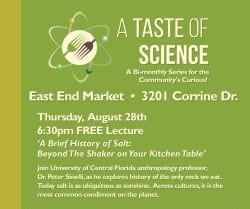Salt: The Only Rock We Eat
 What: Taste of Science Presentation “A Brief History of Salt: Beyond the Shaker on Your Kitchen Table”
What: Taste of Science Presentation “A Brief History of Salt: Beyond the Shaker on Your Kitchen Table”
Who: Dr. Peter Sinelli , UCF Instructor of Anthropology, specializing in Archaeology
When: Thursday, August 28, 2014, 6:30 p.m.
Where: East End Market in Audobon Park
Today salt is as ubiquitous as sunshine. Across cultures, it is the most common condiment on the planet. Anywhere in the industrialized world a pound of it can be had at the grocery for less than a dollar, and in winter trucks dump millions of tons of it on our roads each time it snows just a little. And because it is so cheaply added to almost everything we eat to enhance flavor, our own doctors tell us to limit our intake of it because we consume too much of it without even trying.
But until about a century ago, salt was one of the most prized commodities on Earth. Humble salt? Why? Because it is essential to the biological function of all terrestrial vertebrates, including Homo sapiens. Over time as a species, humanity has demonstrated that it can get along quite nicely without agriculture, or fossil fuels, or even smartphones and Facebook. But we literally will cease to exist without a regular intake of sodium chloride. People need salt to live, and in past times when they did not enjoy the surfeit of it that we have today, they did whatever was necessary to obtain it.
The earliest states in human history trace their roots, in part, to management of this resource. The early Mesopotamian states and Chinese Dynasties funded their empires by controlling it, and fought wars with their rivals over access to it. It was so valuable, even Roman Legionnaires were sometimes paid in it (indeed the Latin word for salt, “sal”, is the root word for the English term “salary”). Salt built empires. Salt dominated commerce and helped chart the path of many modern Nation States. Salt made some people millionaires while simultaneously subjugating countless others to its world order, even amongst indigenous peoples in North America who lived well before Columbus. It is a fascinating little rock, and the human aspect of its story will be revealed at this discussion.
Dr. Sinelli is an instructor of anthropology who specializes in archaeology. He received his Ph.D. from the University of Florida in 2010. Dr. Sinelli’s research interests include Caribbean prehistory, migration and island colonization theory, settlement patterns and ecological adaptation, archaeological ceramics, physical anthropology and maritime and underwater archaeology. Dr. Sinelli has been at UCF since 2006 and teaches The Human Species, General Anthropology, Sex, Gender, and Culture, Archaeology of Caribbean Piracy, Archaeology of Sex and conducts a Caribbean Archaeology Study Abroad program.

